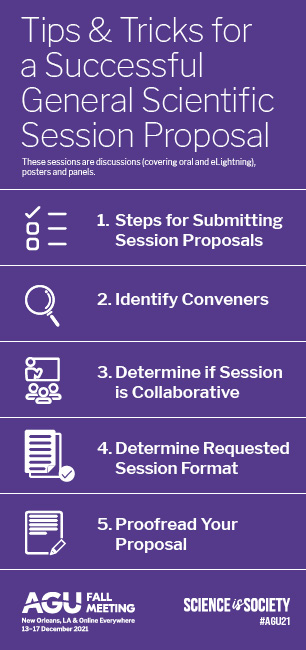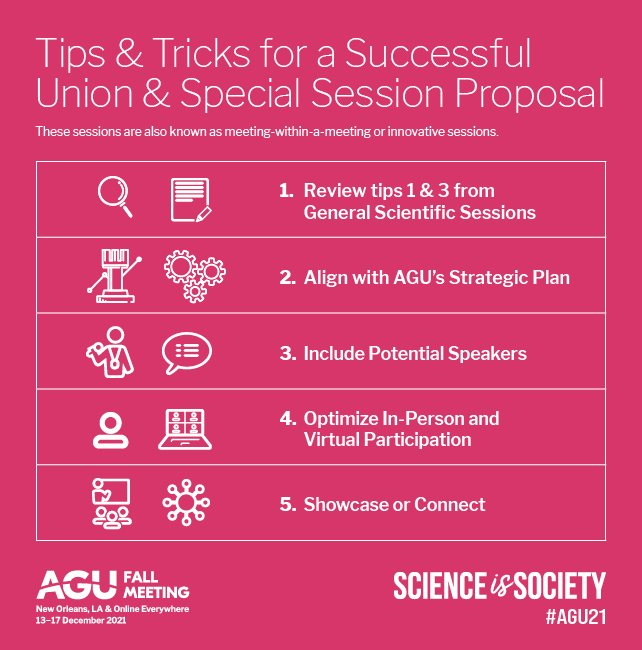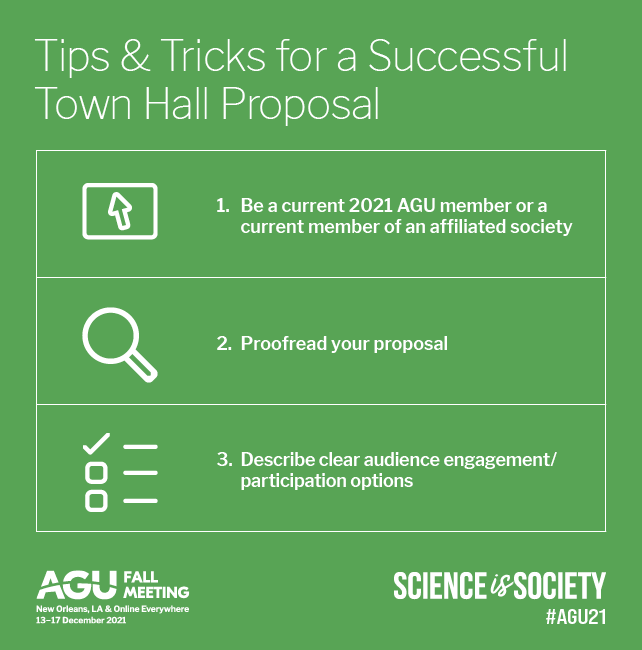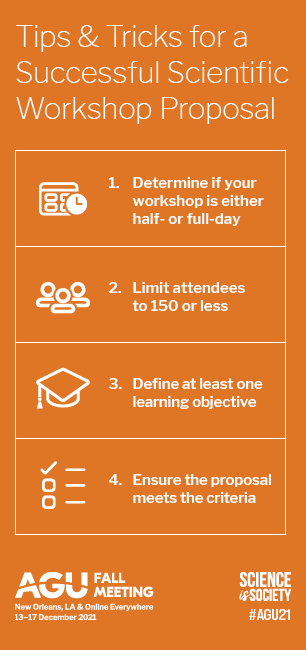
Proposal Submission Instructions
Proposal Submission Instructions
Proposals are now closed.
With a hybrid in-person and online AGU Fall Meeting 2021, attendees will be able to choose how they want to engage with scientific content. By submitting a proposal, you’re helping to shape the discussions at #AGU21 and within the Earth and space sciences community.
We encourage proposals (i.e., general scientific sessions, Union & special sessions, town halls and scientific workshops) with diverse groups of conveners and session chairs who can work together to broaden participation. All organizers and chairs should review AGU's Scientific Integrity and Professional Ethics Policy. Please note, sessions proposals should not be in tribute or in honor of someone, however proposals may focus on their contributions to the work or field and the current and future state of science.
Read the details for each proposal type so you know what is required, when you will be notified, how proposals are evaluated and other pertinent information. Use our templates next to each type of general scientific session, town hall or scientific workshop. Review proposals that have been submitted to ensure yours will not significantly overlap with others.
After abstracts are received, the final decisions about a proposal format are made by the Fall Meeting Program Committee. Session conveners will be informed of acceptance in June and approved sessions will open for abstract submission in mid-June. Please note that all authors who submit an abstract to a session are subject to the AGU membership fee, abstract submission fee, and meeting registration fee.
As always, our primary goal is to ensure a safe and productive meeting. We are actively watching advice on gathering and travel and working with local, national and international advisory groups. If conditions and advice change and warrant a reduced in-person event, or fully virtual event again, we will inform conveners and the AGU community as soon as possible. We expect to have further updates at least by the time abstracts open for submission in mid-June.
General Scientific Sessions
-
1Identify the primary convener who will be the main point of contact for the session. This person must be a current 2021 AGU member or a current member of an affiliated society/organization. If you are not a current AGU member but you are a member of a co-sponsoring organization, email the Scientific Program Team for help with submitting your session proposal. Each proposal must have between two and four conveners, including the primary convener. All individuals listed must have agreed to serve as a convener before submitting the proposal. Co-conveners are not required to be AGU members. However, to fully participate in the planning and scheduling process in August, current 2021 membership is required. Pro tip: Consider an early career scientist and ensure you have a diverse set of conveners.
-
2Consider collaborative sessions that would list your session as cross-listed, co-organized and co-sponsored. By selecting these options, you indicate opportunities for collaboration or a connection between related sessions and across topics. Use our flow chart
 to help you decide if a collaborative session makes sense for your proposal.
to help you decide if a collaborative session makes sense for your proposal. -
3
Visit Call for Proposals to indicate your preference for the different types of general scientific sessions, i.e., a discussion (oral or eLightning), poster or panel session. The final decision on your session type is made by the Fall Meeting Program Committee. If the session proposal is accepted for the Fall Meeting, conveners may submit abstracts to their own sessions, however they cannot be invited authors and should be scheduled as a poster presentation.
-
4Proofread your proposal. You may submit more than one proposal, but ensure the topics are different and across disciplines. Proposals that are celebratory or honorary will generally not be considered. Proposals that are primarily advertisements of commercial products and services or contain the name of a specific experiment in the title/description will be not be considered. The Fall Meeting Program Committee may: move sessions to another or more appropriate AGU section than the one to which it was submitted, request conveners revise the session title and/or description or merge proposals on similar topics.

Union & Special Sessions
Here are the general tips and tricks for a successful Union and special session proposal.
-
1Review tips 1 & 3 for general scientific sessions (above) since those also apply here.
-
2List how the session aligns with the strategic goals and mission of AGU and affiliated societies/organizations.
-
3Include potential speakers who are of high benefit to the AGU community as well as diverse presenters and conveners. Speakers can be confirmed upon proposal acceptance.
-
4
Optimize in-person and virtual participation and presentations in a dynamic way and creatively demonstrate the value and potential of remote participation and engagement.
-
5Showcase or connect remote locations, labs and/or field sites as part of the presentation and session.

Town Halls
Town halls will be one-hour in length and focused on topics that do not compete with or duplicate scientific sessions. They should NOT be submitted on topics that would be better suited as a session proposal. The Fall Meeting Program Committee will make the final decision on which proposals are accepted for #AGU21.
Here are the general tips and tricks for a successful town hall proposal.
-
1Submitter must be MUST be a current 2021 AGU member or a current member of an affiliated society/organization. If you are not a current AGU member but you are a member of a co-sponsoring organization, email the Scientific Program Team for help with submitting your town hall proposal. In addition, all town hall participants, presenters and organizers must register to attend Fall Meeting in order to attend the town hall.
-
2Proofread your proposal. You may submit more than one proposal, but ensure the topics are different and across disciplines. The proposal should not compete with or duplicate scientific sessions and used to primarily to gather input from the AGU community through audience participation. The Fall Program Meeting Committee may request conveners revise the proposal title and/or description or merge proposals on similar topics.
-
3
Describe clear audience engagement/participation options during the one-hour long session using a variety of formats (e.g., presentation, roundtable or panel discussion).

Scientific Workshops
The Fall Meeting Program Committee will make the final decision on which proposals are accepted for #AGU21.
Here are the general tips and tricks for a successful scientific workshop proposal.
-
1Determine if your workshop is either half-day or full-day (4 hours and 8 hours respectively for in-person and 3 hours and 6 hours respectively for virtual). All in-person workshops will include breakfast and/or lunch depending on full-day or half-day scheduling.
-
2
There is a limit of 150 attendees per workshop. In addition to paying the registration fee for Fall Meeting, AGU will charge workshop attendees an additional fee to attend each individual workshop. These fees will be posted in the coming months.
-
3Define at least one learning objective.
-
4
